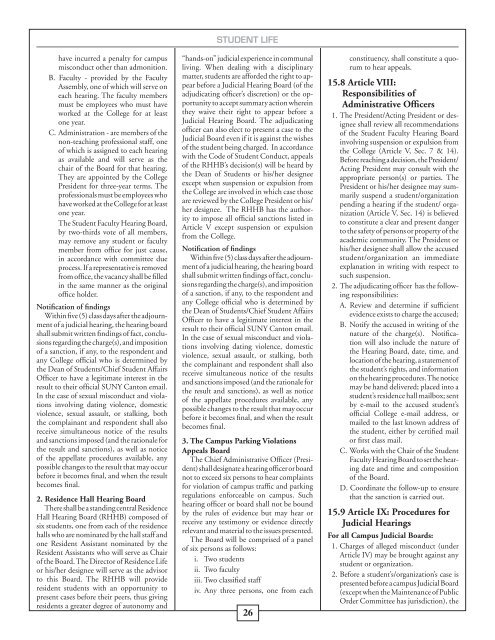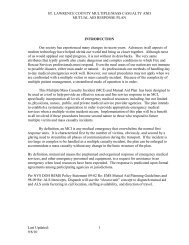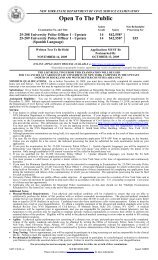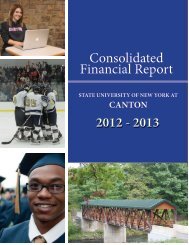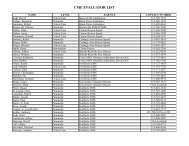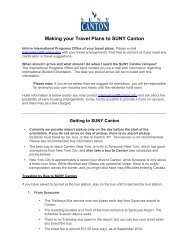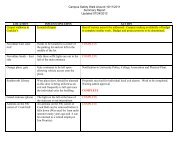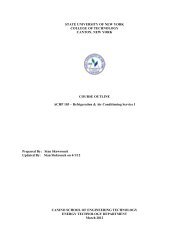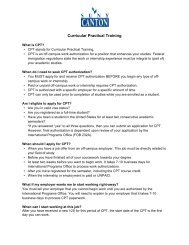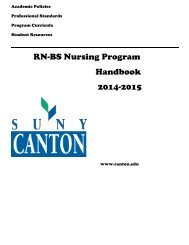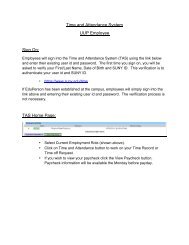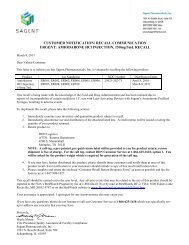Student Handbook - SUNY Canton
Student Handbook - SUNY Canton
Student Handbook - SUNY Canton
You also want an ePaper? Increase the reach of your titles
YUMPU automatically turns print PDFs into web optimized ePapers that Google loves.
have incurred a penalty for campus<br />
misconduct other than admonition.<br />
B. Faculty - provided by the Faculty<br />
Assembly, one of which will serve on<br />
each hearing. The faculty members<br />
must be employees who must have<br />
worked at the College for at least<br />
one year.<br />
C. Administration - are members of the<br />
non-teaching professional staff, one<br />
of which is assigned to each hearing<br />
as available and will serve as the<br />
chair of the Board for that hearing.<br />
They are appointed by the College<br />
President for three-year terms. The<br />
professionals must be employees who<br />
have worked at the College for at least<br />
one year.<br />
The <strong>Student</strong> Faculty Hearing Board,<br />
by two-thirds vote of all members,<br />
may remove any student or faculty<br />
member from office for just cause,<br />
in accordance with committee due<br />
process. If a representative is removed<br />
from office, the vacancy shall be filled<br />
in the same manner as the original<br />
office holder.<br />
Notification of findings<br />
Within five (5) class days after the adjournment<br />
of a judicial hearing, the hearing board<br />
shall submit written findings of fact, conclusions<br />
regarding the charge(s), and imposition<br />
of a sanction, if any, to the respondent and<br />
any College official who is determined by<br />
the Dean of <strong>Student</strong>s/Chief <strong>Student</strong> Affairs<br />
Officer to have a legitimate interest in the<br />
result to their official <strong>SUNY</strong> <strong>Canton</strong> email.<br />
In the case of sexual misconduct and violations<br />
involving dating violence, domestic<br />
violence, sexual assault, or stalking, both<br />
the complainant and respondent shall also<br />
receive simultaneous notice of the results<br />
and sanctions imposed (and the rationale for<br />
the result and sanctions), as well as notice<br />
of the appellate procedures available, any<br />
possible changes to the result that may occur<br />
before it becomes final, and when the result<br />
becomes final.<br />
2. Residence Hall Hearing Board<br />
There shall be a standing central Residence<br />
Hall Hearing Board (RHHB) composed of<br />
six students, one from each of the residence<br />
halls who are nominated by the hall staff and<br />
one Resident Assistant nominated by the<br />
Resident Assistants who will serve as Chair<br />
of the Board. The Director of Residence Life<br />
or his/her designee will serve as the advisor<br />
to this Board. The RHHB will provide<br />
resident students with an opportunity to<br />
present cases before their peers, thus giving<br />
residents a greater degree of autonomy and<br />
STUDENT LIFE<br />
“hands-on” judicial experience in communal<br />
living. When dealing with a disciplinary<br />
matter, students are afforded the right to appear<br />
before a Judicial Hearing Board (of the<br />
adjudicating officer’s discretion) or the opportunity<br />
to accept summary action wherein<br />
they waive their right to appear before a<br />
Judicial Hearing Board. The adjudicating<br />
officer can also elect to present a case to the<br />
Judicial Board even if it is against the wishes<br />
of the student being charged. In accordance<br />
with the Code of <strong>Student</strong> Conduct, appeals<br />
of the RHHB’s decision(s) will be heard by<br />
the Dean of <strong>Student</strong>s or his/her designee<br />
except when suspension or expulsion from<br />
the College are involved in which case those<br />
are reviewed by the College President or his/<br />
her designee. The RHHB has the authority<br />
to impose all official sanctions listed in<br />
Article V except suspension or expulsion<br />
from the College.<br />
Notification of findings<br />
Within five (5) class days after the adjournment<br />
of a judicial hearing, the hearing board<br />
shall submit written findings of fact, conclusions<br />
regarding the charge(s), and imposition<br />
of a sanction, if any, to the respondent and<br />
any College official who is determined by<br />
the Dean of <strong>Student</strong>s/Chief <strong>Student</strong> Affairs<br />
Officer to have a legitimate interest in the<br />
result to their official <strong>SUNY</strong> <strong>Canton</strong> email.<br />
In the case of sexual misconduct and violations<br />
involving dating violence, domestic<br />
violence, sexual assault, or stalking, both<br />
the complainant and respondent shall also<br />
receive simultaneous notice of the results<br />
and sanctions imposed (and the rationale for<br />
the result and sanctions), as well as notice<br />
of the appellate procedures available, any<br />
possible changes to the result that may occur<br />
before it becomes final, and when the result<br />
becomes final.<br />
3. The Campus Parking Violations<br />
Appeals Board<br />
The Chief Administrative Officer (President)<br />
shall designate a hearing officer or board<br />
not to exceed six persons to hear complaints<br />
for violation of campus traffic and parking<br />
regulations enforceable on campus. Such<br />
hearing officer or board shall not be bound<br />
by the rules of evidence but may hear or<br />
receive any testimony or evidence directly<br />
relevant and material to the issues presented.<br />
The Board will be comprised of a panel<br />
of six persons as follows:<br />
i. Two students<br />
ii. Two faculty<br />
iii. Two classified staff<br />
iv. Any three persons, one from each<br />
26<br />
constituency, shall constitute a quorum<br />
to hear appeals.<br />
15.8 Article VIII:<br />
Responsibilities of<br />
Administrative Officers<br />
1. The President/Acting President or designee<br />
shall review all recommendations<br />
of the <strong>Student</strong> Faculty Hearing Board<br />
involving suspension or expulsion from<br />
the College (Article V, Sec. 7 & 14).<br />
Before reaching a decision, the President/<br />
Acting President may consult with the<br />
appropriate person(s) or parties. The<br />
President or his/her designee may summarily<br />
suspend a student/organization<br />
pending a hearing if the student/ organization<br />
(Article V, Sec. 14) is believed<br />
to constitute a clear and present danger<br />
to the safety of persons or property of the<br />
academic community. The President or<br />
his/her designee shall allow the accused<br />
student/organization an immediate<br />
explanation in writing with respect to<br />
such suspension.<br />
2. The adjudicating officer has the following<br />
responsibilities:<br />
A. Review and determine if sufficient<br />
evidence exists to charge the accused;<br />
B. Notify the accused in writing of the<br />
nature of the charge(s). Notification<br />
will also include the nature of<br />
the Hearing Board, date, time, and<br />
location of the hearing, a statement of<br />
the student’s rights, and information<br />
on the hearing procedures. The notice<br />
may be hand delivered; placed into a<br />
student’s residence hall mailbox; sent<br />
by e-mail to the accused student’s<br />
official College e-mail address, or<br />
mailed to the last known address of<br />
the student, either by certified mail<br />
or first class mail.<br />
C. Works with the Chair of the <strong>Student</strong><br />
Faculty Hearing Board to set the hearing<br />
date and time and composition<br />
of the Board.<br />
D. Coordinate the follow-up to ensure<br />
that the sanction is carried out.<br />
15.9 Article IX: Procedures for<br />
Judicial Hearings<br />
For all Campus Judicial Boards:<br />
1. Charges of alleged misconduct (under<br />
Article IV) may be brought against any<br />
student or organization.<br />
2. Before a student’s/organization’s case is<br />
presented before a campus Judicial Board<br />
(except when the Maintenance of Public<br />
Order Committee has jurisdiction), the


